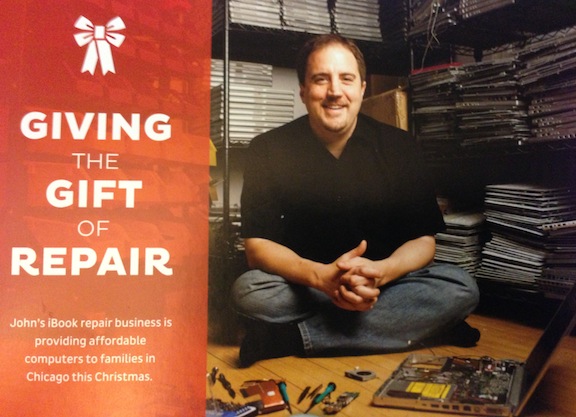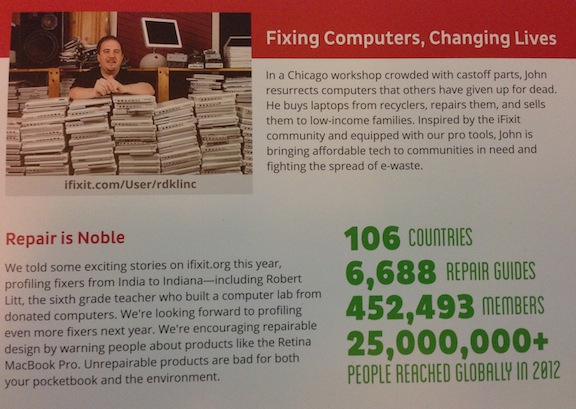Apple, Amazon, and the Shrinking Internet Landscape
November 19, 2018
Don't Spend Money Starting Your Business
September 16, 2018
Amazon MacBook Sellers Suspended over Bogus Customer "Counterfeit" Claims
November 06, 2016
I am now aware of a couple different Amazon MacBook sellers who very recently, through no fault of their own, have woken up to find their accounts suspended because an angry customer clicked the "counterfeit" button in one of Amazon's various feedback mechanisms.
Obviously, there is no such thing as a counterfeit MacBook. Likely, the customers just clicked every button possible to get their complaints heard. It's conceivable that a 3rd party power adapter or battery prompted the claim -- with Amazon, you just never know what triggers any action, and unfortunately there is no intelligent entity on the Amazon side willing to look at these cases and realize, "Hey, there's no such thing as a counterfeit MacBook, so this is clearly in error." In the Kafka-esque, algorythmically-determined world of Amazon, you often end up with a suspended account, with no clear idea why, and limited means of recourse.
What is clear here is that the recent hysteria over 3rd party power adapters being called "fake", "counterfeit", and "knockoffs" is now having a negative effect in the refurbishing world, and Amazon is freaking out at even the slightest suggestion that a device is not OEM. As I have stated before: This is why it is so important that we must allow for the differentiation between legitimate 3rd party devices and ones that are actually fraudulently claiming to be OEM. When we paint with too broad a brush and all 3rd party devices and components arbitrarily get labeled "fake" and "counterfeit", this negative backlash on our industry is exactly what we get.
To make matters worse, several manufacturers on Amazon have become "by permission only", meaning that sellers must be approved by Amazon (and likely the OEM) to sell those brands. If Apple goes in that direction, and the hundreds of Amazon MacBook refurbishers are banned, then millions of older MacBooks will have lost their biggest and most legitimate marketplace, and will therefore be doomed to eBay, CraigsList, or even more marginalized arenas.
It's simply impossible for the mid to low-end Apple refurbishing world to exist without the use of 3rd party power adapters and batteries. Five-year-old laptops from recyclers, schools, and corporations do not come with enough good OEM batteries or power adapters to support the industry, and when you're talking about a $100-$400 laptop, the inclusion of a $79 power adapter and/or a $99 battery tanks the very prospect of being a viable product. A quality 3rd party power adapter and/or battery is the only solution.
As crappy as 3rd party replacement components can sometimes be, we need to support their right to exist and do what we can to make them better and identify the good ones -- our repair/reuse/refurbishing world depends on it!
ComEd Smart Home Showcase Essay
July 01, 2015
About a year ago I entered a ComEd contest hoping to win solar panels for my roof. I didn't win, probably in part due to the fact that I had an old roof at the time. But I just came across the essay again, and while it's not an epic feat of writing, it's certainly relevant to recycling, energy conservation, and many of the issues that I have become familiar with over the years, so I thought I'd post it:
Unfortunately, a house doesn’t come with a manual.
Twelve year ago, as a naive new homeowner, one of my first impressions was that the washer and dryer were the same models that I had grown up with in the 1980s. Another was that I didn’t know how to use the thermostat. When I moved it slightly to the left, the house got cold. To the right, the house became a sauna. Also, I wondered, what was the second trash bin in the alley for? I guessed it was recycling, but not knowing what to put in it, I was intimidated.
A $350 utility bill was the first sign that my house was not efficient. I quickly realized my habit of leaving the lights on was probably not good for my wallet. Every day after work, I toured the house to see if any light bulbs were out, and usually one was. Another finding -- the house had been sold to me with all the outer windows open, and not realizing this, I had left them that way all winter. Whoops!
Five years ago I quit my corporate job and started a computer repair business. At first I didn’t think about environmental implications, and it was just a way to make money. But I soon realized that the broken computers I bought from electronics recyclers would have been scrapped if I hadn’t found them. I was, effectively, making a living off of someone else’s trash. This was a turning point for me -- the idea that there was so much waste in the world, so much unused energy discarded, that I was making a living by simply utilizing what others had thrown away.
From that point, I started to see things differently. I searched the Internet and learned what to put in the recycling bin. I found out that my 30-year-old appliances, while well-built, were far from efficient. I replaced my bulbs with fluorescents, and since then I have almost forgotten what it’s like to change one.
Traveling abroad with this new perspective, I noticed lights turning off automatically upon exiting a room. All bulbs were fluorescents. Cars were very small, and so completely packed that people hung out the windows. Tire “re- treading” stations were everywhere. I came to the sobering realization that people were not doing these things out of some good-natured desire to save the planet, but rather out of necessity. I discovered that we are lucky -- only people so relatively wealthy could grow up being as naive about energy as I had been.
I would be a great candidate for the Smart Home Showcase precisely because I have been on this personal journey, and smart appliances and technologies constitute the perfect next step. Using energy efficiently is not always easy, or obvious, but with a combination of awareness, effort, and technology, it’s possible for everyone to improve and make a huge difference. I’d be proud to be involved in an effort toward that end, and to be an official advocate.
It's an iFixit/RDKL Inc. Christmas!
December 16, 2012
I am honored to be featured on this year's iFixit Christmas card! I have to say, it's always been great to have an ally in the repair business like iFixit, and I honestly can't imagine what repair would be like without them. Not only do they provide amazing guides that make my job easier, and allow me a forum to communicate with others on the topic of repair, but they are relentlessly dedicated to the cause of making the world a better and more repairable place. Thanks, iFixit! Also, thanks to Seth Lowe at sethlowephoto.com for taking the pictures!





